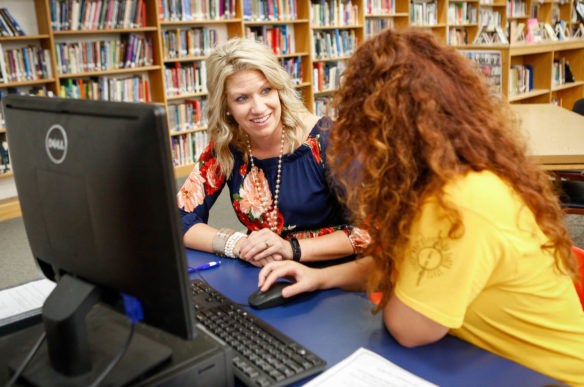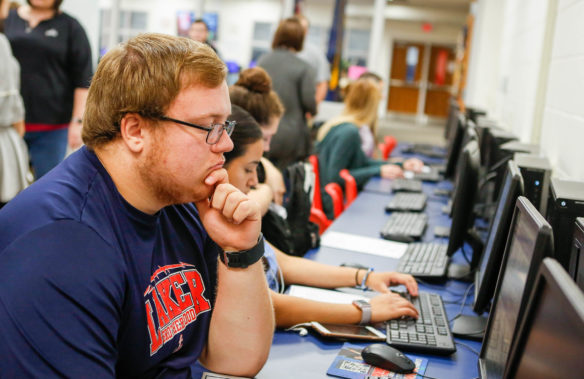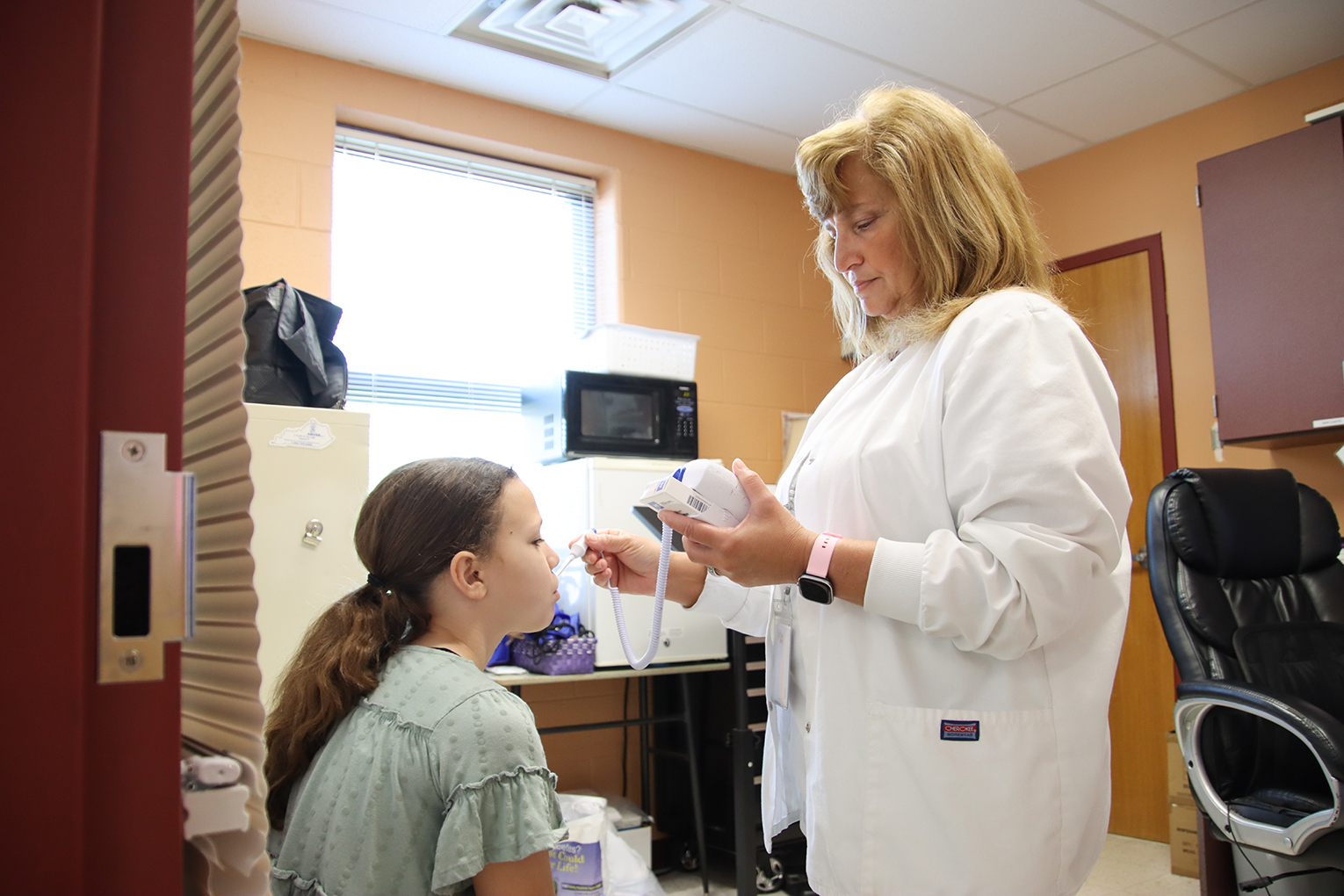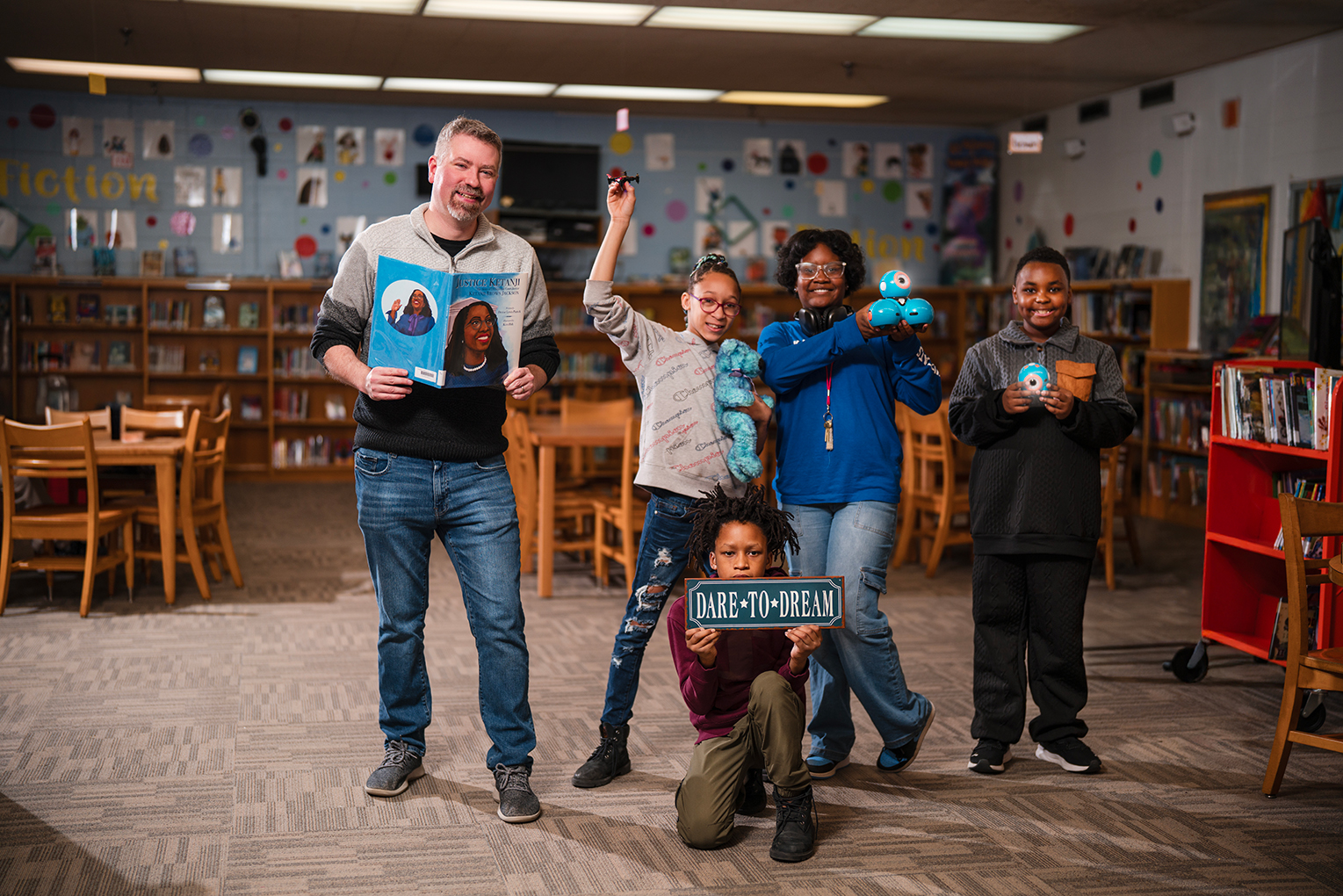
Robin Rixon, a college and career readiness counselor at Russell County High School, works with senior Maggie Hart during the school’s college application day. Rixon is one of a number of counselors who were hired through a federal grant and retained by their districts after the grant expired.
Photo by Mike Marsee, Sept. 29, 2017
By Mike Marsee
mike.marsee@education.ky.gov
Robin Rixon found her dream job, but she didn’t know if she would get to keep it.
Rixon, who was teaching business and marketing at Russell County High School, took a new position in 2014 that was created through a federal grant designed to reduce barriers for students to college and career readiness (CCR).
The grant money has been spent, but Rixon and most of the other people in the college and career readiness counselor (CCRC) positions made possible by the grant are still at work today after their schools and districts discovered their work was too valuable to discontinue.
“The feedback from the community was tremendous about this position and the work that I do,” Rixon said.
Rixon and 23 other CCRCs were placed in 22 districts in the 2013-14 school year as part of a $41 million federal Race to the Top grant. The grant ended in June, but most of the counselors were retained by their districts.
“That is the No. 1 bit of evidence of their value,” said Dennis Horn, who served as the CCR manager for the grant – branded in Kentucky as kid-FRIENDLy – for the Green River Regional Educational Cooperative (GRREC) and the Ohio Valley Educational Cooperative (OVEC). “Two years into the grant, we had people saying, ‘We don’t want to be without this position anymore.’”
The CCRC positions were different in every school, with the job duties varying based on each school’s needs. Most of them shared some common duties, however, including:
- providing college and career counseling for individual students and their family members;
- working with groups such as gap students who might need extra attention;
- matching students with appropriate college or career experiences; and
- creating and maintaining a college and career readiness center at their school.
Horn said the work of the counselors was one of the most successful elements of the kid-FRIENDLy grant. Data collected from the Kentucky Department of Education (KDE) show steady growth in the college and career readiness scores across all 22 participating districts:
- From the 2013 baseline year to the 2015-16 school year, CCR scores increased 28.2 points on average at those districts. The statewide increase was 14.4 points.
- In 2015-16, eight of the 22 districts achieved a CCR score of 100 points or more; 12 districts achieved a score of 80 points or more. The statewide average was 68.5.
- Over three years, the largest single-district CCR score increase was 61.5 points.
“An effective partnership between CCRCs and school counselors is integral to the workforce development in our state,” said Robin McCoy, the comprehensive school counseling program coordinator at KDE and a former school counselor. “With all shareholders working together to ensure the whole child needs of our students are being met, we will see – and have seen – great growth in student achievement and in our initiatives to provide a society with healthier, productive citizens.”
Rixon works in partnership with the two school counselors at Russell County High, as well as with the school’s family resource and youth services center coordinator and its liaison at the Lake Cumberland Area Technology Center. She works closely with students in areas such as career prep, soft skills, college visits, college and career fairs and scholarships.
“It allows me to get in and work with the students one-on-one. I have a to-do list every day, but whatever’s on my to-do list can ultimately wait depending on the needs of the student who walks in my office,” she said.
In Daviess County, College and Career Readiness Counselor Jeremy Camron’s to-do list starts with helping students at Apollo High School imagine a future that might seem foreign to many of them. Camron said only about 15 percent of the population in the area served by the school has a four-year degree, and a large number of the students he works with would be first-generation college students.
“Part of me realized everybody doesn’t fit inside that square box,” Camron said, referring to those who aren’t typical college-bound students. “With this job, you can strategize in a way that helps motivate them, gives them purpose and gives them a long-term goal.”
Camron has orchestrated tours of colleges and industries. He has strengthened a partnership between Apollo High and Owensboro Community and Technical College, which effectively serves as a technology center for students in that area. He is also responsible for dual-credit and post-secondary opportunities within the school.
“Roughly 65 percent of our senior class has at least one dual-credit class going,” he said.
McCoy said the CCRCs’ work – just like that of school counselors, who are doing many of the same things – aligns with the three core values of comprehensive school counseling.
“Kentucky school counselors are tasked with the responsibility of ensuring students are ready to successfully transition through each life stage, have equitable access to educational experiences and to cultivate the emotional, social and behavioral growth of students,” she said. “Because this role is so critical to the success of our Kentucky students both in healthy development and in workforce development, comprehensive school counseling programs should include a collaboration of efforts by multiple shareholders.”

Students complete college applications online during a college application day at Russell County High School. The 22 districts served by college and career counselors hired through a federal grant saw their college and career readiness scores increase at a pace well above the statewide average during the life of the grant.
Photo by Mike Marsee, Sept. 29, 2017
These counselors have been active not only in their schools, but also in their communities, developing partnerships with local businesses and industries.
“I feel like we are the advocate for our kids, but we’re also the advocate for the workforce in our communities,” Camron said. “We have the ability to be in our schools, but also to be in our communities.”
The counselors have their own advocates in people like Meg Crittenden, who worked with the counselors in GRREC’s service area for two years as the cooperative’s college and career readiness mentor.
“What I saw in two years was incredible. I think it even surprised the CCRCs, the relationships they were able to build within the school and the community and with the parents, but mostly the awareness within the students themselves,” Crittenden said. “The students at the end of those two years seemed far more aware of the choices that they had and what they wanted to do.”
Michael Ford, the superintendent of Russell County schools, said the counselors have filled a critical role.
“Their work has really spoken for itself because everybody sees the value of it,” Ford said. “For a lot of these kids, we are their family. We have to help them get into college, get into tech school. It’s going to take a little bit of time to see the return on investment, but it’s nice for our folks to have one person to go to.”
Districts served by the grant had to accept the counselors four years ago – they were required in the grant – even though administrators weren’t quite sure what they were going to do. They were seeing the benefits of the counselors within a couple of years, and now many of them can’t imagine doing without them.
“It was an absolute gift. We had superintendents saying, ‘We will find the money to do it because it has to be done,’” Horn said.
Ford, who stated the case for the counselors in a GRREC meeting last year, was one of them.
“There’s not another position that can fill that role and really devote the time to it that it needs,” he said. “Our board believes in it; I believe in it and Mrs. Rixon.”
Horn, who has moved on to another role with OVEC, said the districts that decided not to employ their counselors when the grant expired did so for budgetary reasons. He said improved CCR numbers point to the counselors’ success, but even better are the success stories each of them have.
“I love to see the outcomes,” Rixon said. “So many former students have come back and said, ‘Look at me now. Thank you for pointing me in the right direction.’”
Ford said Rixon has left no stone unturned, whether she is working with a student who is headed to a college honors program or one who is headed for an apprenticeship and the workforce.
“She has become so engaged in not just the job, but individual students’ success, and I think she takes that personally,” Ford said. “These kids can help break a cycle because of that. Sometimes it just takes someone sitting down with them and saying, ‘This is how it can work for you.’”
MORE INFO …
Jeremy Camron jeremy.camron@daviess.kyschools.us
Meg Crittenden meg.crittenden@grrec.org
Michael Ford michael.ford@russell.kyschools.us
Dennis Horn dhorn@ovec.org
Robin Rixon robin.rixon@russell.kyschools.us
KDE resources on comprehensive school counseling




Leave A Comment